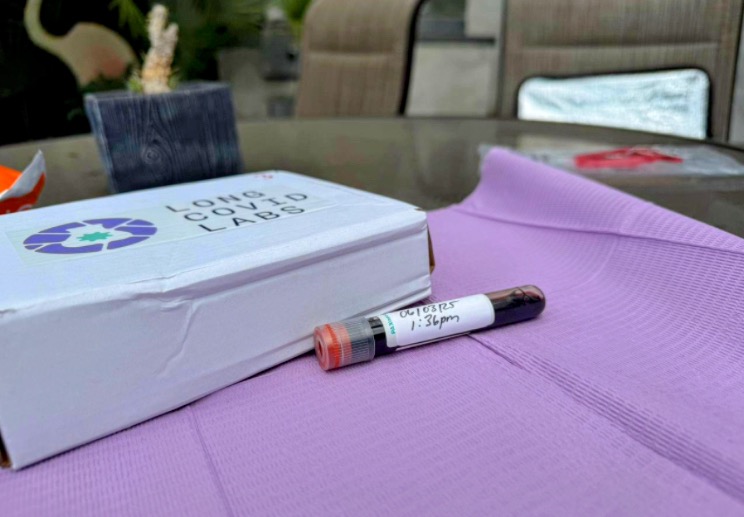.png)
How Can Real-World Evidence Be Used to Expedite Long COVID Treatments?
Traditional research moves slowly, but patients with Long COVID can’t wait. Learn how Long COVID Labs is charting a new path to bring treatments closer, faster.
LONG COVID LABS is excited to announce our recent grant award of $22,000 to Dr. Michael Peluso at UCSF to further study a blood test for the presence of the SARS-CoV-2 spike protein.
A pivotal moment in Long COVID research occurred in 2022 when Swank et al. published this ground-breaking paper (1) showing that this spike protein, normally produced during acute illness, was still circulating in the blood of Long COVID patients.
In their 2024 paper, the same team further revolutionized our understanding when they found spike protein not only in the blood of long covid patients, but also in 20% of healthy controls (2).
These results point to the possibility that the SARS-CoV-2 virus may remain in people’s bodies after their acute infection has passed. However, there are still several unanswered questions:
There’s still so much we need to know about the significance of these results.

“The goal of the project is to assess the feasibility and utility of including the single-molecule array assay as a screening tool for Long COVID clinical trials focused on viral persistence.
We will evaluate the proportion of individuals in existing clinical trials who would meet eligibility criteria for future studies based on this assay and estimate how many individuals would need to be screened in order to enroll future Long COVID trials.”
Essentially, if the spike protein blood test turns out to be a reliable biomarker for SARS-CoV-2 persistence in Long COVID, it could truly revolutionize our ability to study and treat this disease. We would be able to understand why some patients responded positively to treatments like antivirals and mAbs, while others didn’t.

Many in the Long COVID community were surprised when the first round of clinical trials testing treatments against viral persistence (such as Paxlovid and monoclonal antibodies) failed to show definitive results.
However, many researchers including Dr. Peluso believe part of the issue may have been lack of appropriate inclusion criteria in these trials. Essentially, without a definitive method to test for SARS-CoV-2 persistence, it’s possible that these trials included patients who were suffering due to a different root cause - and were never going to respond positively to antiviral treatments.
If the spike protein blood test turns out to be a reliable biomarker, these insights would give researchers a much better idea of which patients to include in future clinical trials – ensuring we get to clear answers much faster.
Dr. Peluso will be using our grant funds to further examine the significance of this test. He’ll be using this assay to test blood samples from participants in the UCSF Long-term Impact of Infection with Novel Coronavirus program (LIINC for short).
The LIINC program has access to samples from pre-pandemic controls, meaning the test results will be run against samples from people who we know for sure had never had Covid (at the time). This will help to ensure the highest accuracy of the results, by providing a clear control group to compare the LIINC patients’ results against.
We’re incredibly grateful to Dr. Peluso and his colleagues at the LIINC team for their dedication to understanding Long COVID.
We know these funds are going to be used to make an important contribution to our knowledge of the spike protein, viral persistence, and Long COVID as a whole.
Thank you so much, Dr. Peluso, for everything you’re doing! We can’t wait to see where this research leads.
1) Swank, Z., Senussi, Y., Manickas-Hill, Z., Yu, X. G., Li, J. Z., Alter, G., & Walt, D. R. (2023). Persistent Circulating Severe Acute Respiratory Syndrome Coronavirus 2 Spike Is Associated With Post-acute Coronavirus Disease 2019 Sequelae. Clinical infectious diseases : an official publication of the Infectious Diseases Society of America, 76(3), e487–e490. https://doi.org/10.1093/cid/ciac722
2) Swank, Z., Borberg, E., Chen, Y., Senussi, Y., Chalise, S., Manickas-Hill, Z., Yu, X. G., Li, J. Z., Alter, G., Henrich, T. J., Kelly, J. D., Hoh, R., Goldberg, S. A., Deeks, S. G., Martin, J. N., Peluso, M. J., Talla, A., Li, X., Skene, P., Bumol, T. F., … RECOVER consortium authors (2024). Measurement of circulating viral antigens post-SARS-CoV-2 infection in a multicohort study. Clinical microbiology and infection : the official publication of the European Society of Clinical Microbiology and Infectious Diseases, 30(12), 1599–1605. https://doi.org/10.1016/j.cmi.2024.09.001